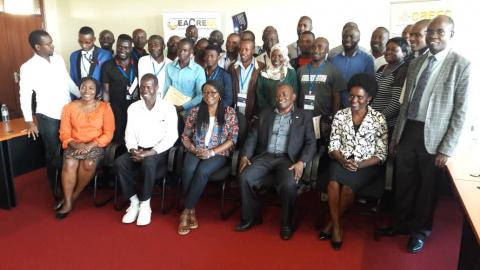28 Successfully Completes EAC Regional Training Course on Development, Design, Installation and Operation of Small Hydropower Plants (SHP)
Kampala, 4 October 2019: Twenty-eight engineers and technicians from Burundi, Kenya, Tanzania and Uganda received Certificates of Attendance upon successfully completing EAC Regional Training Course on Development, Design, Installation and Operation of Small Hydropower Plants Opens, which was held at the Centre for Research in Energy and Energy Conservation (CREEC) Makerere University from 30 September to 4 October 2019. The training course consisted of lectures and practical session on design, project development process, quality control and assurance, electro-mechanical equipment, as well as operation and maintenance of small hydropower plant. The participants also got opportunity to visit a hydropower plant.
One of the factors hindering the exploitation of small hydropower (SHP) resources in the EAC region is lack of competent manpower for design and project development. There is also limited technical expertise in operation and maintenance, which affect sustainability of the existing SHP installations. “Our engineers and technicians lack both the experience and confidence to undertake engineering challenges like design and installation of SHP. After the 5 days of intensive interactions, this training has not just given you the technical exposure but also the confidence that you can do it”, noted Mr Michael Kiza, Programme Management Expert.
Eng. Emmy Matovu, Chairman of Hydropower Association of Uganda (HPAU), who is also project developer in SHP noted that plant components are very expensive, hence requiring good maintenance routine. He urged the grandaunts put the knowledge acquired into good practice in order to ensure sustainability SHP.
Ms Mary Suzan Abbo, CREEC’s Managing Director helped the participants to appreciate that the training did not only impart technical knowledge, but also provided them opportunity to consider making resolutions on how to do things differently as well as establishing networks with peers from other SHP. “This relationship asset – the network you have established should help you to exchange operational and maintenance information beyond your own power plants”, she noted.
Mr. Bruno Otto, UNIDO Country Representative for Uganda emphasized the linkage between energy and other Sustainable Development Goals (SDGs). “You should not look at yourselves simply as people operating in the power plants, but rather know that the energy you generate is needed for industrialization to cause economic development. But as we do this, we have to think of how our energy production related to the 5Ps of SDGs, namely People, Peace, Prosperity and the Planet”, he emphasized. Mr Otto further encouraged the participants to consider how their activities in power generation fits in the global trends like globalization, digitalization and climate change.
Ms Esther Nyanzi, the Chief Executive Officer of Uganda National Renewable Energy and Energy Efficiency Alliance (UNREEEA) the needs for participants to put the knowledge to good use. “The knowledge you have acquired here must be used to create impacts. You must leave a legacy”, she emphasized.
In her closing Statement, Ms Carole Rosenlund, Head of African Programmes at International Center for hydropower (ICH) of Norway encouraged the participants to think of innovations. “Mobile Money services is now gaining popularity in Norway. This was not invented in Norway or any other developed countries. It was done here in Africa. We can also do the same in other areas like energy”, she stressed. She further noted that gender disparity is still large in the energy sector. This training course, like the one we had in Dar es Salam last year had only 3 female participants!” she lamented. She would wish to see more female participants in the subsequent training courses.
This training course has been organized by EACREEE, UNREEEA, CREEEC, and HPAU with support from bfz Germany, UNIDO and the Austrian Development Agency (ADA). This training course is part of a series of small hydropower capacity building programme being implemented in the region by EACREEE and other partners.





